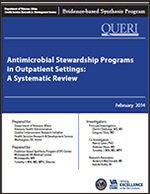
Principal Investigators:
Dimitri Drekonja, MD, MS;
Gregory Filice, MD
Co-Investigators:
Nancy Greer, PhD;
Andrew Olson, MD;
Timothy J. Wilt, MD, MPH
Download PDF: Complete Report, Executive Summary, Report, Appendices
The majority of antimicrobials prescribed to humans originate in outpatient settings. In making prescribing decisions, primary care providers are faced with patient expectations, and with patient and provider lack of awareness of antimicrobial resistance and lack of understanding of the seriousness of the antimicrobial resistance problem.
Antimicrobial stewardship programs (ASPs) are a focused effort by a health care system or a part of the system (ie, an outpatient clinic) to optimize the use of antimicrobial agents. The goals of an ASP are to improve patient outcomes, decrease adverse consequences including from adverse drug reactions and antimicrobial associated infections (eg, Clostridium difficile diarrhea), reduce or prevent antimicrobial resistance, and deliver cost-effective therapy. The emphasis is on appropriate use, selection, dosing, and duration of antimicrobial therapy.
The purpose of this review is to synthesize the evidence about the effectiveness of ASPs implemented in outpatient settings. We categorized ASPs based on the primary focus of the intervention as described by the study author. Our categories are: provider and/or patient education, provider feedback, guidelines, delayed prescribing, communications skills training, restriction, decision support, financial incentives, and laboratory testing. The topic was nominated by Matthew Goetz, MD, Chief, Infectious Diseases, VA Greater Los Angeles Healthcare System, on behalf of the VA Antimicrobial Stewardship Task Force, and is intended to provide a summary of the evidence on outpatient ASPs to guide clinical practice and policy within the Veterans Healthcare System. We developed the following key questions with input from a technical expert panel.
Key Question #1: What is the effectiveness of antimicrobial stewardship programs in outpatient
settings on the following:
a. Primary Outcome: Antimicrobial prescribing (decision to prescribe, selection of
antimicrobial, duration of treatment, guideline concordant use)
b. Secondary Outcomes:
Key Question #2: What are the key intervention components associated with effective outpatient antimicrobial stewardship (eg, type of intervention; personnel mix; level of support)?
Key Question #3: Does effectiveness vary by a) clinic type or setting (primary care clinic vs emergency department or urgent care; VA, non-VA) or b) suspected patient condition (respiratory tract infections, urinary tract infections, soft-tissue infections)?
Key Question #4: What are the harms of antimicrobial stewardship programs in outpatient settings?
Key Question #5: Within the included studies, what are the barriers to implementation, sustainability, and scalability of antimicrobial stewardship programs in outpatient settings?